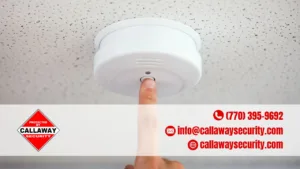When it comes to home security, many people immediately think of IP cameras as the go-to solution. While IP cameras can be a valuable tool in protecting your home, they are not the only solution available. In fact, there are a variety of other measures you can take to enhance the security of your home without relying solely on cameras.
Key Takeaways
- Home security is important for protecting your family and belongings.
- Basic measures like locking doors and windows can go a long way in preventing break-ins.
- Security alarms and sensors can provide added protection and peace of mind.
- Smart locks and keyless entry systems offer convenience and enhanced security.
- A comprehensive home security plan should include measures for both indoor and outdoor spaces.
Understanding the Importance of Home Security
Before diving into alternative home security measures, it’s important to understand why home security is so crucial. According to statistics, a home burglary occurs every 13 seconds in the United States. This means that no matter where you live, there is a real risk of your home being targeted by burglars or intruders.
The emotional and financial impact of a home invasion can be devastating. Not only do you lose valuable possessions, but you also lose your sense of safety and security in your own home. The aftermath of a break-in can leave lasting psychological effects on homeowners and their families. Additionally, the financial burden of replacing stolen items and repairing any damage can be significant.
Basic Home Security Measures
While IP cameras can provide an extra layer of security, there are basic measures that should be taken regardless. These include locking doors and windows whenever you leave the house or go to bed. It may seem obvious, but many burglaries occur simply because homeowners forget to lock up.
Another important step is to keep valuables out of sight. This means closing blinds or curtains so that potential burglars cannot see inside your home. Additionally, avoid leaving expensive items such as laptops or jewelry in plain view from windows.
Lastly, consider keeping a spare key with a trusted neighbor instead of hiding it outside your home. Many burglars are familiar with common hiding spots for spare keys and can easily gain access to your home if they find it.
Installing Security Alarms and Sensors
Security alarms and sensors are an effective way to deter burglars and alert homeowners of any potential break-ins. There are various types of security alarms and sensors available, including motion sensors, door/window sensors, and glass break sensors.
When choosing a security system for your home, consider factors such as the size of your property, the number of entry points, and your budget. It’s also important to choose a reputable security company that offers 24/7 monitoring and quick response times.
Strengthening Doors and Windows
Doors and windows are common entry points for burglars, so it’s crucial to strengthen them to make it more difficult for intruders to gain access. One way to do this is by reinforcing door frames and hinges. This can be done by installing metal plates or strike plates on the door frame and using longer screws to secure hinges.
Installing window locks is another effective measure. Window locks can prevent burglars from easily opening windows from the outside. Additionally, applying security film to windows can make them more resistant to break-ins.
Using Smart Locks and Keyless Entry Systems
Smart locks and keyless entry systems offer convenience and enhanced security for homeowners. With smart locks, you can control access to your home remotely using a smartphone app. This means you can lock or unlock your doors from anywhere, as well as receive notifications when someone enters or exits your home.
When choosing a smart lock or keyless entry system, consider factors such as compatibility with your existing door hardware, ease of installation, and additional features such as keypad entry or fingerprint recognition.
Creating a Neighborhood Watch Program
A neighborhood watch program is a community-based initiative that involves residents working together to prevent crime in their neighborhood. By keeping an eye out for suspicious activity and communicating with each other, neighbors can help deter burglaries and other crimes.
Benefits of a neighborhood watch program include increased community cohesion, improved communication between neighbors, and a greater sense of security. To start a neighborhood watch program in your community, reach out to your local law enforcement agency for guidance and support.
Securing Outdoor Spaces with Lighting and Landscaping
Outdoor lighting is an important aspect of home security. Well-lit exteriors can deter burglars by eliminating hiding spots and making it more difficult for them to approach your home unnoticed. Install motion-activated lights near entry points and along pathways to ensure that any movement triggers the lights.
Landscaping can also play a role in deterring burglars. Avoid planting tall shrubs or trees near windows, as they can provide cover for intruders. Instead, opt for low-maintenance plants and bushes that do not obstruct the view of your home from the street.
Protecting Valuables with Safes and Hidden Storage
Safes are an effective way to protect valuable items such as jewelry, cash, and important documents. There are various types of safes available, including wall safes, floor safes, and portable safes. When choosing a safe, consider factors such as size, fire resistance, and security features such as biometric locks or digital keypads.
In addition to safes, consider utilizing hidden storage options to keep valuables out of sight. This can include using diversion safes that look like everyday objects or installing hidden compartments in furniture or walls.
Developing a Comprehensive Home Security Plan
To ensure the effectiveness of your home security measures, it’s important to develop a comprehensive home security plan. This plan should outline all the measures you have in place to protect your home and should be regularly reviewed and updated as needed.
Include details such as emergency contact numbers, instructions for arming and disarming security systems, and protocols for responding to potential threats. Share this plan with all members of your household so that everyone is aware of their roles and responsibilities in maintaining home security.
While IP cameras can be a valuable tool in home security, they are not the only solution available. By implementing a combination of basic home security measures, installing security alarms and sensors, strengthening doors and windows, using smart locks and keyless entry systems, creating a neighborhood watch program, securing outdoor spaces with lighting and landscaping, protecting valuables with safes and hidden storage, and developing a comprehensive home security plan, you can enhance the security of your home and protect your loved ones and belongings. Take action today to ensure the safety and security of your home.
FAQs
What are some effective strategies for home security without IP cameras?
There are several effective strategies for home security without IP cameras, including installing deadbolts on all exterior doors, using motion sensor lights, and keeping shrubs and trees trimmed to eliminate hiding spots for potential intruders.
What is a deadbolt?
A deadbolt is a type of lock that can only be opened with a key or by turning a knob from the inside. It provides an extra layer of security for exterior doors.
How do motion sensor lights work?
Motion sensor lights use infrared technology to detect movement and turn on automatically. They can be installed outside of your home to deter potential intruders.
Why is it important to keep shrubs and trees trimmed?
Shrubs and trees can provide hiding spots for potential intruders, making it easier for them to approach your home undetected. Keeping them trimmed eliminates these hiding spots and makes it more difficult for intruders to approach your home unnoticed.
What are some other effective strategies for home security?
Other effective strategies for home security include installing a security system, using smart locks, and keeping valuables out of sight from windows. It is also important to always lock doors and windows when leaving your home.











